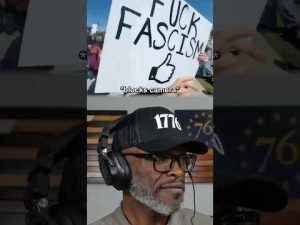**Byron Donalds and the Controversy of Racial Double Standards in Politics**
In today’s political circus, few stories capture attention like the recent kerfuffle involving Representative Byron Donalds and fellow Democratic politician Jasmine Crockett. This scenario serves as a classic example of how racial dynamics and political affiliations can brew a tempestuous mix in the political arena. Donalds, a rising star in the Republican Party, has recently been criticized for his marriage to a white woman, prompting a flurry of discussions—some heated, some humorous—about racial loyalty and identity politics.
Crockett, in her remarks, expressed a bewildering viewpoint that seemed to question Donald’s authenticity as a Black man due to his marriage. She suggested that his relationship and certain comments he made about historical contexts were signs of him being “whitewashed.” This line of argument created a stir among observers, as it raised eyebrows about the inconsistency in how political figures are held accountable based on race. After all, Crockett has been notably silent about other prominent figures, like Kamala Harris or Ketanji Brown Jackson, who have similar marriages. It seems that double standards are par for the course in modern American politics, especially when it comes to race.
One cannot help but wonder if there’s more to this than meets the eye. While Crockett appeared to deride Donalds for his relationship choices, she conveniently overlooked the marriage status of her fellow Democrats. This selective scrutiny raises questions about the very narrative leftists often tout about inclusivity and acceptance. The inconsistency in Crockett’s criticism makes it appear less about genuine concern and more about silencing those who dare to diverge from the mainstream Democratic talking points.
Donalds has been labeled as “not our kinfolk” by Crockett, a statement that reeks of elitism and a rigid expectation of loyalty to a specific ideological framework—and a racial one at that. The reality is that Donalds chooses to forge his own path in a political environment that can be unforgivingly dogmatic. His willingness to embrace different perspectives has evidently earned him contempt from some members of the left. It paints a rather grim picture of a world where a person’s identity can be questioned based solely on their choices of marriage and allegiances.
Amidst all this drama, it’s hard to ignore one glaring issue: the demographic trends and the realities of modern relationships. Many discussions around these political controversies can lead to a deeper examination of societal dynamics, including the changing roles within households and relationships across race lines. The data suggests that many women, regardless of race, have adopted varying degrees of feminism that often suppress traditional values like marriage and familial support. This has led some men to seek partnerships that align better with their values and aspirations for a family.
As debates continue to unfold, one can only hope that the chatter around figures like Byron Donalds inspires a more profound conversation about what it means to represent one’s community authentically. Should personal choices dictate political allegiance? Should those choices be weaponized as a means to undermine one’s credibility? In the end, as politics becomes increasingly embroiled with personal identity, it’s vital to remember that tolerance and understanding should triumph over division and petty squabbles.
So next time you hear the clashes of colorful accusations in political debates, perhaps it’s wise to pause and consider the broader implications. After all, the real world outside the political arena looks much different than the oftentimes ridiculous caricatures painted within it. It’s about time for political discourse that transcends petty identity battles and embraces a more genuine dialogue about individual aspirations and the value each person can bring to the table—no matter who they choose to marry.







